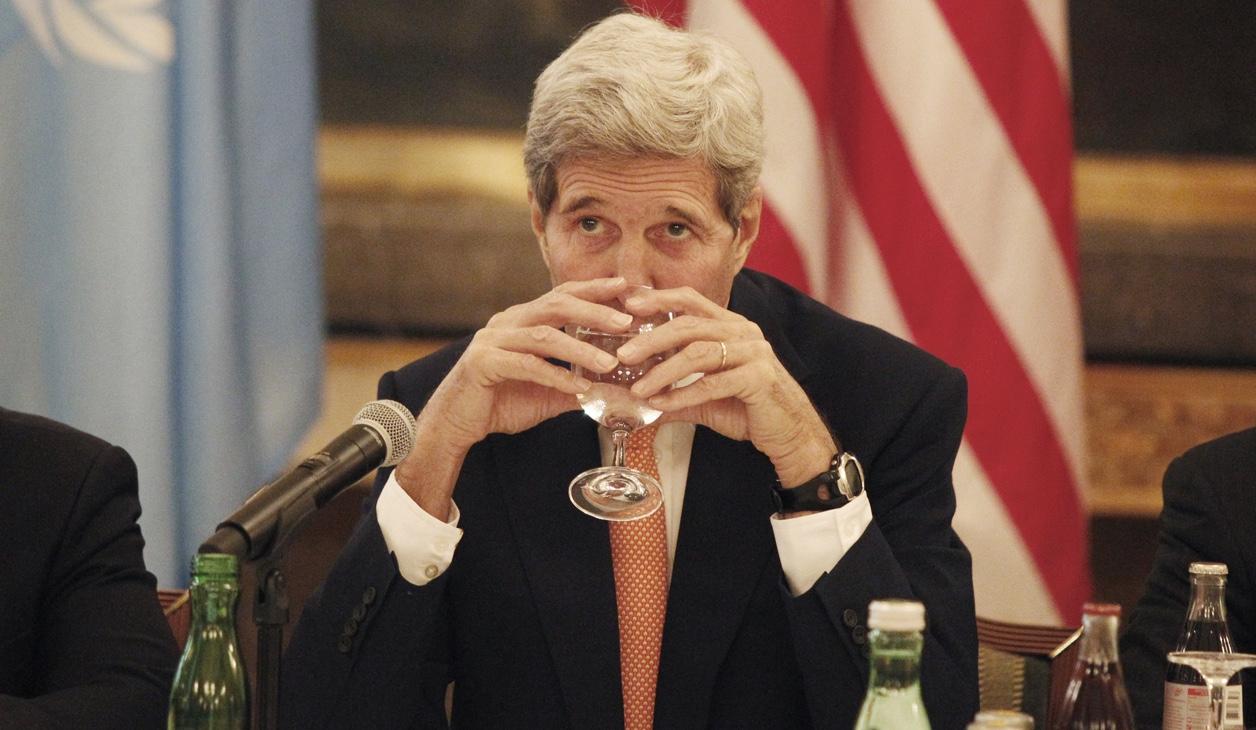Iran will join the US for talks on the Syrian conflict
US Secretary of State John Kerry takes a drink of water during a meeting to discuss the Syrian conflict with foreign ministers of Turkey, Russia and Saudi Arabia in Vienna, on Oct. 23, 2015.
Editor's note: This is Chatter, our morning rundown of what you need and want to know around the world. Fortunately for us all, you can have Chatter emailed to you every day. Just sign up here!
NEED TO KNOW:
The United States, Russia, Britain, France, Germany, Egypt, Jordan, Qatar, Saudi Arabia, Turkey and the United Arab Emirates are all participating this week in talks aimed at finding a solution to the Syrian conflict.
And today, Iran said it has accepted an invitation to join as well. This is a big deal because Iran has historically been excluded from these sorts of events. Two things, however, have changed US calculations.
First, there is the Iran deal, which was struck in July. The deal prevents Iran from working toward any kind of nuclear weapon in exchange for the easing of international sanctions. But it will also go a long way toward opening Iran up to the world and the world up to Iran, argues Stephen Kinzer, an expert on Iran. These will be the first major negotiations between the United States and Iran since they reached that agreement. And it shows some flexibility by Iran’s supreme leader, who had earlier said Iran would not participate in any more discussions with the United States. Already, it seems, the Iran deal is changing the region in a significant way.
Second, Iran simply has to be part of the talks. After Russia it is the only other country that is aiding Syrian President Bashar al-Assad. It’s hard to imagine how any kind of solution could be found without including Iran at the table.
The talks will be interesting. It will no longer be a group of leaders who all have similar aims. Most of the major players will be involved and not all of them will easily agree on a way forward.
Russia and Iran want to see a political solution that doesn’t remove Assad from office, at least not immediately. For the United States and its allies, removing Assad from office is a priority. US officials believe that Assad’s brutal reaction to at first peaceful protests and then an armed rebellion has created the space for the Islamic State to thrive. So for them, if the Islamic State is going to be defeated, Assad must go.
Those are opposite positions that are going to be hard to overcome. The previous round of talks ended last Friday without any resolution. But Russia and the United States agreed on some common goals: fighting extremist groups, keeping Syria unified, and allowing Syrians to decide the future of their country.
That last point seems an odd one to make by the leaders of two countries meeting in a third country with a bunch of other countries to decide the future of Syria.
WANT TO KNOW:
Mexico’s Supreme Court might decide today to effectively legalize the recreational use of marijuana. Advocates say that legalization would pull some control of the drug away from cartels. But that’s not why the Supreme Court might make pot legal.
The case is in response to an appeal filed by the Mexican Association for Responsible Self-Consumption and Tolerance, a marijuana advocacy group, after the health regulator rejected its request for permission to grow weed for recreational purposes. Their arguments are not about safety, but about personal liberty.
“We’re arguing that the government is infringing on the constitutional doctrine of the free development of personality,” Andres Aguinaco, a lawyer representing the group, told Fusion.
If the group succeeds, it could “legalize the consumption and production of marijuana for recreational use,” Reuters reported.
STRANGE BUT TRUE:
The UN’s World Health Organization released a report on Monday linking the consumption of processed or red meat to cancer. And then everyone freaked out. The news went viral.
Lost in the discussion was much of the nuance in the report. It really said that eating an excess of red meat could increase the risks of getting cancer. And that eating beef as part of a balanced diet is probably fine.
The damage, however, might already be done. Countries that rely on exporting beef to prop up their economies — like Uruguay, Brazil and Argentina — are worried. Any decline in beef sales would especially hurt Brazil, where inflation is right now in the double-digits.
We want to hear your feedback so we can keep improving our website, theworld.org. Please fill out this quick survey and let us know your thoughts (your answers will be anonymous). Thanks for your time!
